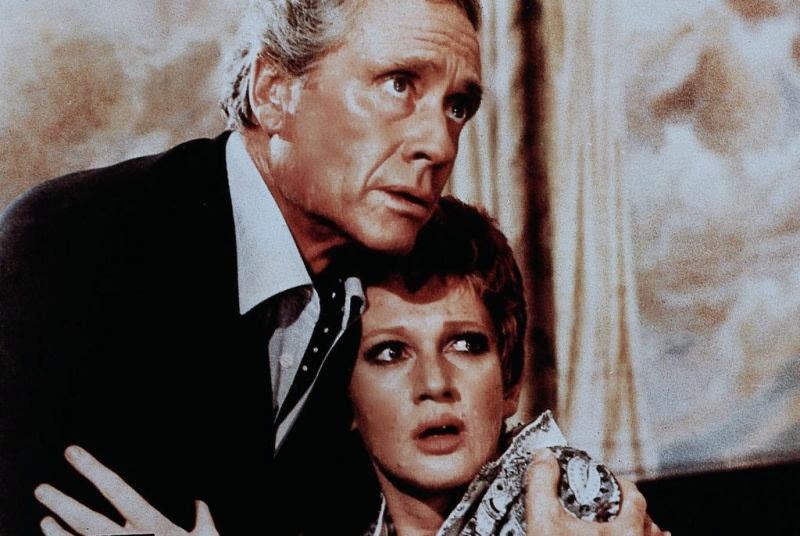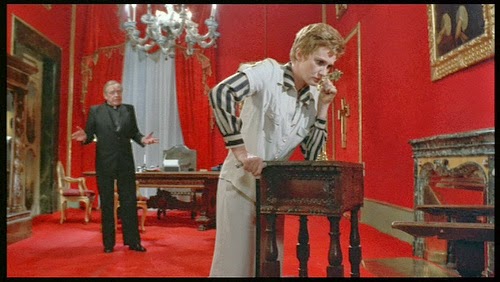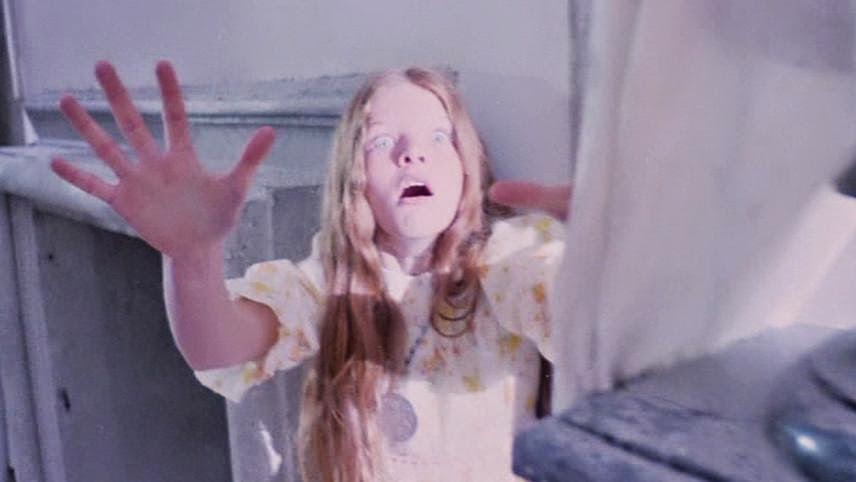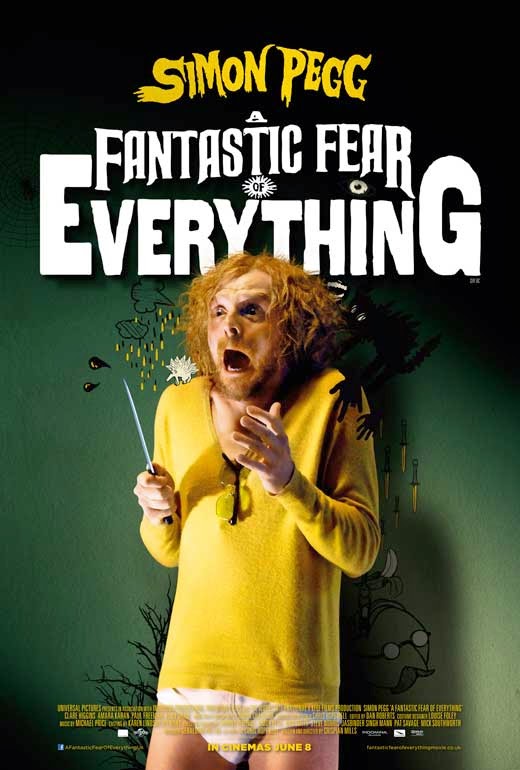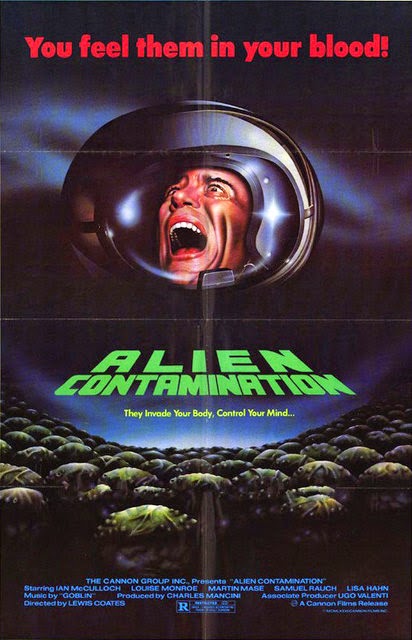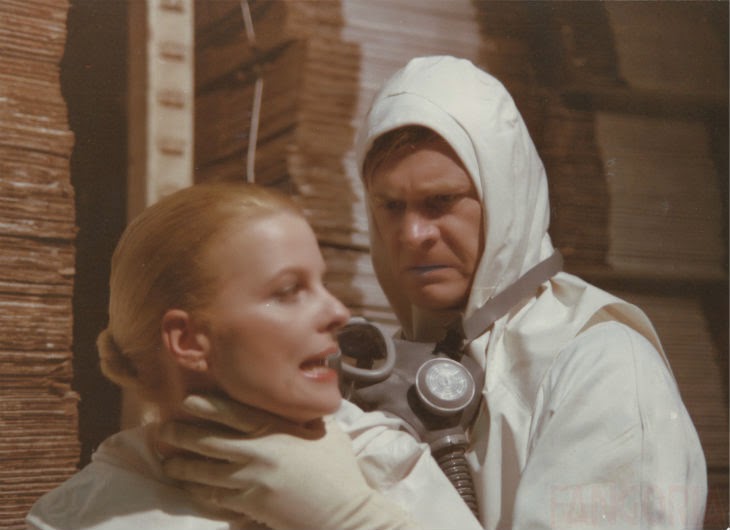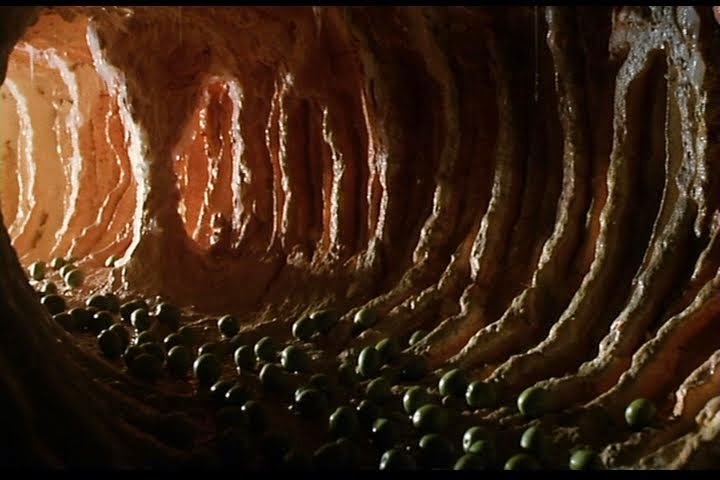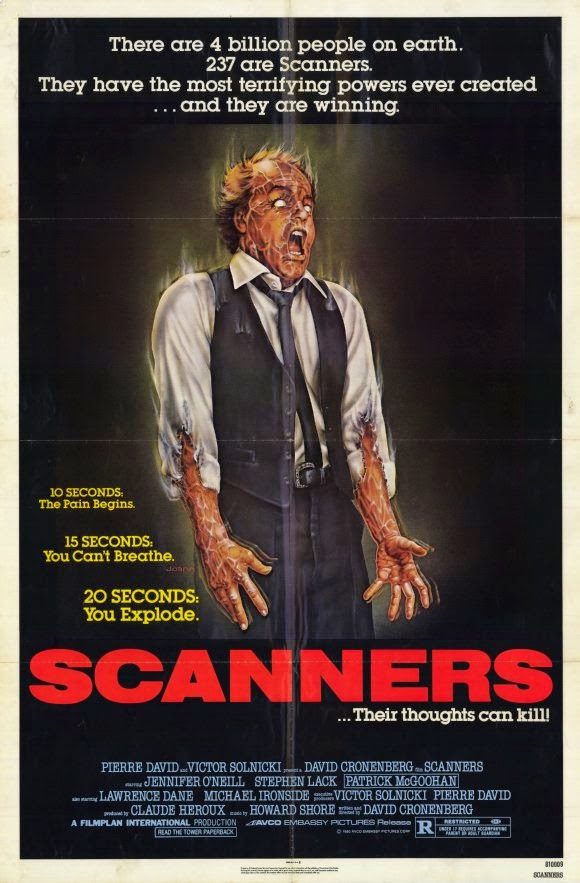NYMPHOMANIAC
(Denmark/Germany/France/Belgium - 2013; US release 2014)
Written and directed by Lars von Trier.
VOL I:
Cast: Charlotte Gainsbourg, Stellan Skarsgard, Stacy Martin, Shia LaBeouf, Christian Slater, Uma Thurman, Sophie Kennedy Clark, Connie Nielsen, Jens Albinus, Hugo Speer, Cyron Melville, Felicity Gilbert, Anders Hove, Jesper Christensen, Saskia Reeves, Ananya Berg, Nicolas Bro. (Unrated, 117 mins)
VOL II:
Cast: Charlotte Gainsbourg, Stellan Skarsgard, Stacy Martin, Shia LaBeouf, Christian Slater, Jamie Bell, Willem Dafoe, Mia Goth, Jean-Marc Barr, Udo Kier, Michael Pas, Caroline Goodall, Kate Ashfield, Ananya Berg, Shanti Roney, Kookie Ryan, Papou. (Unrated, 124 mins)
Arthouse provocateur Lars von Trier prides himself on walking the fine line between visionary auteur and misanthropic asshole, a firm believer that any publicity is good publicity, whether he's putting his lead actresses through hell to get the performance he needs from them, or prompting John C. Reilly to walk off of 2005's MANDERLAY over filming the actual slaughter of a donkey, or getting kicked out of the Cannes Film Festival for saying he sympathizes with Hitler. Like a bratty kid, von Trier revels in attention but with rare exception, backs it up with great films. When he announced NYMPHOMANIAC would run over five hours and include professional actors in unsimulated, hardcore sex scenes, the buzz was on. While the director's complete five-and-a-half hour cut was released in Europe, the US release was split into two films running around two hours each, released a few weeks apart (the director's cut will likely surface on Blu-ray). Von Trier supervised the US cuts, and while much explicit material was removed, quite a bit remains, including some penetrative shots that involve body doubles and CGI trickery melding the below-the-belt region with the name actors' bodies from the waist up. In other words, Shia LaBeouf may have auditioned for the film by sending von Trier a homemade sex tape, and while he's doing frontal nudity, the erection and beyond are the work of his body double. The same goes for actress Stacy Martin fellating a man (Jens Albinus) on a train. It's a very real-looking prosthetic penis, and while we see semen drooling out of Martin's mouth, the director's cut apparently shows the spurting ejaculation, for those so inclined.
A lot of this is von Trier just being von Trier, but contrary to initial reports and the director's own incessant hype, NYMPHOMANIAC, at least in its US incarnation, isn't quite the wall-to-wall porno fuckfest that it's been made out to be. In many ways, it's a von Trier greatest hits package, with cues from and callbacks to his past films like DOGVILLE (2003), ANTICHRIST (2009) and especially BREAKING THE WAVES (1996). It's von Trier's third straight film with Charlotte Gainsbourg, who's become his muse in misery after the harrowing ANTICHRIST and MELANCHOLIA (2011), where she initially has a supporting role but becomes the focus as the film progresses. Von Trier has a history of pushing his actresses to their limit and getting incredible work from them: Emily Watson's Oscar-nominated performance in BREAKING THE WAVES remains one of the greatest in all of cinema, while Bjork surpassed all expectations in DANCER IN THE DARK (2000). DOGVILLE's Nicole Kidman and MANDERLAY's Bryce Dallas Howard also survived von Trier and lived to tell the tale. In Gainsbourg, von Trier has found a kindred spirit who's willing and eager to go to the dark places others won't. She's the Klaus Kinski to his Werner Herzog, minus the mutual death threats.
As the first half of NYMPHOMANIAC opens, bookish academic Seligman (Stellan Skarsgard) happens upon the unconscious Joe (Gainsbourg) lying in an alley, beaten and bloodied. He helps her back to his apartment, lets her shower and makes her some tea. They begin talking, first about little things, and then she agrees to tell her story. Von Trier plays with the time element a bit, but in the first volume, much of the dramatic weight is carried by 22-year-old newcomer Stacy Martin as young Joe. As older Joe explains, "I discovered my cunt as a two-year-old," and before her age is in double digits (Ananya Berg plays Joe at this age in some discreetly-shot sequences that imply more they show), Joe and her best friend B are exploring themselves in ways that are already threatening to go beyond sliding down the bannister and grinding themselves against the bathroom floor. At the age of 15 (and now played by Martin), Joe asks local stud mechanic Jerome (LaBeouf) to take her virginity, which he does in the most perfunctory fashion imaginable. Nevertheless, the beast has been unleashed as Joe and B (Sophie Kennedy Clark) have contests like sneaking on to a train and screwing as many men as possible during the trip. They even form a club at school devoted to the pursuit of sex without love, though B eventually comes to her own realization that "the secret ingredient to sex is love." Joe believes that love complicates things, and continues sleeping with as many men as possible, eventually reconnecting with Jerome when she applies for a secretarial job at a printing company owned by his uncle (Jesper Christensen), even though she has no secretarial skills. She resists Jerome's advances, spending her evenings maintaining a busy schedule of hourly appointments with men who drop in to have sex with her, often passing one another as one arrives and the other leaves. By her own estimate, she's sleeping with up to eight men on a typical evening, and even devises an elaborate system for deciding which men she'll call back among the many messages on her answering machine. At the end of Vol. 1, Joe decides to settle down for domesticity with the now-successful Jerome, when she finds she can no longer reach orgasm.
In a brilliant debut, Martin is the focal point of the first half of NYMPHOMANIAC, and like Watson in BREAKING THE WAVES, she's up to the challenge even though von Trier saves the worst for Joe for when Gainsbourg assumes the role. For the first half, Gainsbourg is limited to sitting in bed as Joe tells Seligman her story, and the kind-hearted intellectual listens intently, often going off on thematic tangents involving fly fishing, cake forks, Bach, Poe, and mathematical theories that sort-of tie into the psychology of what Joe is telling him. Von Trier also gives Christian Slater his best role in years as Joe's doctor father in flashbacks. Joe loves her father deeply, and the two bond over their shared love of trees and flowers, neither feeling a connection to Joe's "cold bitch" mother (Connie Nielsen). As good as Martin and Slater are, the show-stealer for the first half is Uma Thurman in a one-scene stunner as the enraged wife of Mr. H (Hugo Speer), one of Joe's regular hookups. When Mr. H leaves his wife and shocks Joe by showing up at her place with his suitcases in tow, he's followed closely by Mrs H, who's dragged their three young sons along with her. If that wasn't awkward enough, Joe's next guy (Cyron Melville) shows up and everyone watches Mrs. H maniacally melt down, introducing the boys to Joe so they can "put a face to the all the therapy they'll need down the road," and saying "Would it be alright if I show the children the whoring bed? They need to see it! Let's go see Daddy's favorite place!" Thurman is onscreen for less than ten minutes but she makes every second count, and it's an instant classic of laughing while cringing in pained discomfort, one of those rare instances where a cameo is actually Oscar-worthy.
Vol. 2 picks up with Joe and Jerome married and having a baby. A few years pass as Martin exits and Gainsbourg takes over. The child, Marcel, is now three and though they love each other, Joe and Jerome's sex life has stalled. Jerome encourages her to see other men if it will help her psychologically ("If you buy a tiger, you have to keep it fed," he says). This goes on for some time and eventually leads Joe to the mysterious K (Jamie Bell). K seems to be some sort of Craigslist-type sex therapist/sadist who lives in what appears to be an abandoned office building where women show up for appointments to be beaten. K does not offer sex, and he doesn't allow safe words. You do what he says, period. Joe's sessions with K involve him renaming her "Fido," tying her to a couch, bent over, while he whips her bare ass with a riding crop, then inserting his fingers into her vagina to gauge her arousal. Things just get worse for Joe as her sex addiction, self-loathing and degradation cause her to lose her family. She can barely hold down her office job, routinely fucking male co-workers in the restroom or a closet space. She's ordered into therapy, where she lashes out against a society that judges her and tries to shame her. Now in her mid-40s, she eventually loses any feeling of pleasure, as her vagina is so scarred and worn from the thousands of men over three decades of hook-ups that it spontaneously bleeds, and causes numerous bouts of unbearable, debilitating pain. Joe eventually gets a job as a debt collector/extortionist for the shady L (Willem Dafoe), which leads to her shot at redemption by becoming a mentor to troubled teen P (Mia Goth).
While the first half of NYMPHOMANIAC has its share of dark moments, it's also surprisingly amusing in spots, such as Joe comparing her vagina to the automatic doors at a supermarket ("only with a stronger sensor") or when Seligman echoes the audience's call of bullshit with every one of Jerome's improbably hackneyed returns to the narrative. There's also the standard von Trier button-pushing bits like Joe getting wet standing by her father's death bed, and later in Vol 2, unsubtle Christ metaphors and Joe admitting that she feels a sympathetic kinship with a pedophile (Jean-Marc Barr) because of their "outcast" status (drawing thematic parallels to past von Trier outcasts ike the tragic Bess in BREAKING THE WAVES, Selma in DANCER IN THE DARK, and Grace in DOGVILLE and MANDERLAY). But it's the second half where things take a grim turn, largely with the intensely disturbing sequences involving Bell's K (the much-ballyhooed "Silent Duck" moment when K fists Joe is mostly implied, at least in the US cut), and the effect Joe's behavior has on Jerome and Marcel. I'm still not convinced that his recent public implosion isn't some extended von Trier-coordinated publicity stunt, but credit where it's due--funny accent and all, LaBeouf is actually quite good, especially in the second half. Given the extreme length and the myriad of directions the story takes, von Trier generally keeps things on point even when it threatens to derail at any moment. It only starts to feel choppy as things wind down, especially in the debt collection tangent, which comes out of nowhere and doesn't really feel like it belongs. As shown in her scenes at her jobs, Joe really has no skills other than sexual, which wouldn't seem a prerequisite for tough-talking collecting for a loan shark (perhaps the manipulation aspect?). Also, Joe's relationship with P is never fleshed out, at least not to the point where some of P's actions near the end make complete sense. I see the way the tables get turned and Joe is looking at things from another perspective, but it just feels like something's missing or got lost in the editing.
Like Seligman, the viewer is likely to be skeptical of some of Joe's story. There are many times over the course of the four hours when both Joe and to a lesser extent, Seligman seem like the classic "unreliable narrator." In many ways, NYMPHOMANIAC is film loaded with sex and not really specifically about sex. One popular theory is that Joe is a stand-in for von Trier and that Seligman is every stuffy, erudite, out-of-touch film critic who's judged and vilified him, though this involves a revelation by Seligman that I won't spoil. But Seligman doesn't judge Joe (other than being incredulous over some too convenient developments), which makes him different from every other man she's ever known other than her beloved father. There's a lot to take in--no pun intended--with NYMPHOMANIAC, so much so that sometimes the filmmaking itself is easy to overlook. There are some stunning shots and a strong Andrei Tarkovsky vibe throughout--one shot of older Joe finding "her" tree is breathtaking, and clothed or otherwise, the camera simply adores Martin, who has the most hauntingly seductive gaze you've seen in ages. Even seeing it split into two films--if you see it in its American incarnation, it's best to set four hours aside and just binge it--it probably still needs to be seen again in von Trier's original director's cut. Judging from viewing it in this format, it's not von Trier's best film--it seems to start stumbling with the introduction of L, though that's no fault of Dafoe's-- but it may be his most personal one, and one that reveals more of itself on repeat viewings, however soul-crushing and exhausting that may be. But that's vintage Lars von Trier. Love him or hate him, his films get you talking.
(Denmark/Germany/France/Belgium - 2013; US release 2014)
Written and directed by Lars von Trier.
VOL I:
Cast: Charlotte Gainsbourg, Stellan Skarsgard, Stacy Martin, Shia LaBeouf, Christian Slater, Uma Thurman, Sophie Kennedy Clark, Connie Nielsen, Jens Albinus, Hugo Speer, Cyron Melville, Felicity Gilbert, Anders Hove, Jesper Christensen, Saskia Reeves, Ananya Berg, Nicolas Bro. (Unrated, 117 mins)
VOL II:
Cast: Charlotte Gainsbourg, Stellan Skarsgard, Stacy Martin, Shia LaBeouf, Christian Slater, Jamie Bell, Willem Dafoe, Mia Goth, Jean-Marc Barr, Udo Kier, Michael Pas, Caroline Goodall, Kate Ashfield, Ananya Berg, Shanti Roney, Kookie Ryan, Papou. (Unrated, 124 mins)
Arthouse provocateur Lars von Trier prides himself on walking the fine line between visionary auteur and misanthropic asshole, a firm believer that any publicity is good publicity, whether he's putting his lead actresses through hell to get the performance he needs from them, or prompting John C. Reilly to walk off of 2005's MANDERLAY over filming the actual slaughter of a donkey, or getting kicked out of the Cannes Film Festival for saying he sympathizes with Hitler. Like a bratty kid, von Trier revels in attention but with rare exception, backs it up with great films. When he announced NYMPHOMANIAC would run over five hours and include professional actors in unsimulated, hardcore sex scenes, the buzz was on. While the director's complete five-and-a-half hour cut was released in Europe, the US release was split into two films running around two hours each, released a few weeks apart (the director's cut will likely surface on Blu-ray). Von Trier supervised the US cuts, and while much explicit material was removed, quite a bit remains, including some penetrative shots that involve body doubles and CGI trickery melding the below-the-belt region with the name actors' bodies from the waist up. In other words, Shia LaBeouf may have auditioned for the film by sending von Trier a homemade sex tape, and while he's doing frontal nudity, the erection and beyond are the work of his body double. The same goes for actress Stacy Martin fellating a man (Jens Albinus) on a train. It's a very real-looking prosthetic penis, and while we see semen drooling out of Martin's mouth, the director's cut apparently shows the spurting ejaculation, for those so inclined.
A lot of this is von Trier just being von Trier, but contrary to initial reports and the director's own incessant hype, NYMPHOMANIAC, at least in its US incarnation, isn't quite the wall-to-wall porno fuckfest that it's been made out to be. In many ways, it's a von Trier greatest hits package, with cues from and callbacks to his past films like DOGVILLE (2003), ANTICHRIST (2009) and especially BREAKING THE WAVES (1996). It's von Trier's third straight film with Charlotte Gainsbourg, who's become his muse in misery after the harrowing ANTICHRIST and MELANCHOLIA (2011), where she initially has a supporting role but becomes the focus as the film progresses. Von Trier has a history of pushing his actresses to their limit and getting incredible work from them: Emily Watson's Oscar-nominated performance in BREAKING THE WAVES remains one of the greatest in all of cinema, while Bjork surpassed all expectations in DANCER IN THE DARK (2000). DOGVILLE's Nicole Kidman and MANDERLAY's Bryce Dallas Howard also survived von Trier and lived to tell the tale. In Gainsbourg, von Trier has found a kindred spirit who's willing and eager to go to the dark places others won't. She's the Klaus Kinski to his Werner Herzog, minus the mutual death threats.
As the first half of NYMPHOMANIAC opens, bookish academic Seligman (Stellan Skarsgard) happens upon the unconscious Joe (Gainsbourg) lying in an alley, beaten and bloodied. He helps her back to his apartment, lets her shower and makes her some tea. They begin talking, first about little things, and then she agrees to tell her story. Von Trier plays with the time element a bit, but in the first volume, much of the dramatic weight is carried by 22-year-old newcomer Stacy Martin as young Joe. As older Joe explains, "I discovered my cunt as a two-year-old," and before her age is in double digits (Ananya Berg plays Joe at this age in some discreetly-shot sequences that imply more they show), Joe and her best friend B are exploring themselves in ways that are already threatening to go beyond sliding down the bannister and grinding themselves against the bathroom floor. At the age of 15 (and now played by Martin), Joe asks local stud mechanic Jerome (LaBeouf) to take her virginity, which he does in the most perfunctory fashion imaginable. Nevertheless, the beast has been unleashed as Joe and B (Sophie Kennedy Clark) have contests like sneaking on to a train and screwing as many men as possible during the trip. They even form a club at school devoted to the pursuit of sex without love, though B eventually comes to her own realization that "the secret ingredient to sex is love." Joe believes that love complicates things, and continues sleeping with as many men as possible, eventually reconnecting with Jerome when she applies for a secretarial job at a printing company owned by his uncle (Jesper Christensen), even though she has no secretarial skills. She resists Jerome's advances, spending her evenings maintaining a busy schedule of hourly appointments with men who drop in to have sex with her, often passing one another as one arrives and the other leaves. By her own estimate, she's sleeping with up to eight men on a typical evening, and even devises an elaborate system for deciding which men she'll call back among the many messages on her answering machine. At the end of Vol. 1, Joe decides to settle down for domesticity with the now-successful Jerome, when she finds she can no longer reach orgasm.
In a brilliant debut, Martin is the focal point of the first half of NYMPHOMANIAC, and like Watson in BREAKING THE WAVES, she's up to the challenge even though von Trier saves the worst for Joe for when Gainsbourg assumes the role. For the first half, Gainsbourg is limited to sitting in bed as Joe tells Seligman her story, and the kind-hearted intellectual listens intently, often going off on thematic tangents involving fly fishing, cake forks, Bach, Poe, and mathematical theories that sort-of tie into the psychology of what Joe is telling him. Von Trier also gives Christian Slater his best role in years as Joe's doctor father in flashbacks. Joe loves her father deeply, and the two bond over their shared love of trees and flowers, neither feeling a connection to Joe's "cold bitch" mother (Connie Nielsen). As good as Martin and Slater are, the show-stealer for the first half is Uma Thurman in a one-scene stunner as the enraged wife of Mr. H (Hugo Speer), one of Joe's regular hookups. When Mr. H leaves his wife and shocks Joe by showing up at her place with his suitcases in tow, he's followed closely by Mrs H, who's dragged their three young sons along with her. If that wasn't awkward enough, Joe's next guy (Cyron Melville) shows up and everyone watches Mrs. H maniacally melt down, introducing the boys to Joe so they can "put a face to the all the therapy they'll need down the road," and saying "Would it be alright if I show the children the whoring bed? They need to see it! Let's go see Daddy's favorite place!" Thurman is onscreen for less than ten minutes but she makes every second count, and it's an instant classic of laughing while cringing in pained discomfort, one of those rare instances where a cameo is actually Oscar-worthy.
Vol. 2 picks up with Joe and Jerome married and having a baby. A few years pass as Martin exits and Gainsbourg takes over. The child, Marcel, is now three and though they love each other, Joe and Jerome's sex life has stalled. Jerome encourages her to see other men if it will help her psychologically ("If you buy a tiger, you have to keep it fed," he says). This goes on for some time and eventually leads Joe to the mysterious K (Jamie Bell). K seems to be some sort of Craigslist-type sex therapist/sadist who lives in what appears to be an abandoned office building where women show up for appointments to be beaten. K does not offer sex, and he doesn't allow safe words. You do what he says, period. Joe's sessions with K involve him renaming her "Fido," tying her to a couch, bent over, while he whips her bare ass with a riding crop, then inserting his fingers into her vagina to gauge her arousal. Things just get worse for Joe as her sex addiction, self-loathing and degradation cause her to lose her family. She can barely hold down her office job, routinely fucking male co-workers in the restroom or a closet space. She's ordered into therapy, where she lashes out against a society that judges her and tries to shame her. Now in her mid-40s, she eventually loses any feeling of pleasure, as her vagina is so scarred and worn from the thousands of men over three decades of hook-ups that it spontaneously bleeds, and causes numerous bouts of unbearable, debilitating pain. Joe eventually gets a job as a debt collector/extortionist for the shady L (Willem Dafoe), which leads to her shot at redemption by becoming a mentor to troubled teen P (Mia Goth).
While the first half of NYMPHOMANIAC has its share of dark moments, it's also surprisingly amusing in spots, such as Joe comparing her vagina to the automatic doors at a supermarket ("only with a stronger sensor") or when Seligman echoes the audience's call of bullshit with every one of Jerome's improbably hackneyed returns to the narrative. There's also the standard von Trier button-pushing bits like Joe getting wet standing by her father's death bed, and later in Vol 2, unsubtle Christ metaphors and Joe admitting that she feels a sympathetic kinship with a pedophile (Jean-Marc Barr) because of their "outcast" status (drawing thematic parallels to past von Trier outcasts ike the tragic Bess in BREAKING THE WAVES, Selma in DANCER IN THE DARK, and Grace in DOGVILLE and MANDERLAY). But it's the second half where things take a grim turn, largely with the intensely disturbing sequences involving Bell's K (the much-ballyhooed "Silent Duck" moment when K fists Joe is mostly implied, at least in the US cut), and the effect Joe's behavior has on Jerome and Marcel. I'm still not convinced that his recent public implosion isn't some extended von Trier-coordinated publicity stunt, but credit where it's due--funny accent and all, LaBeouf is actually quite good, especially in the second half. Given the extreme length and the myriad of directions the story takes, von Trier generally keeps things on point even when it threatens to derail at any moment. It only starts to feel choppy as things wind down, especially in the debt collection tangent, which comes out of nowhere and doesn't really feel like it belongs. As shown in her scenes at her jobs, Joe really has no skills other than sexual, which wouldn't seem a prerequisite for tough-talking collecting for a loan shark (perhaps the manipulation aspect?). Also, Joe's relationship with P is never fleshed out, at least not to the point where some of P's actions near the end make complete sense. I see the way the tables get turned and Joe is looking at things from another perspective, but it just feels like something's missing or got lost in the editing.
Like Seligman, the viewer is likely to be skeptical of some of Joe's story. There are many times over the course of the four hours when both Joe and to a lesser extent, Seligman seem like the classic "unreliable narrator." In many ways, NYMPHOMANIAC is film loaded with sex and not really specifically about sex. One popular theory is that Joe is a stand-in for von Trier and that Seligman is every stuffy, erudite, out-of-touch film critic who's judged and vilified him, though this involves a revelation by Seligman that I won't spoil. But Seligman doesn't judge Joe (other than being incredulous over some too convenient developments), which makes him different from every other man she's ever known other than her beloved father. There's a lot to take in--no pun intended--with NYMPHOMANIAC, so much so that sometimes the filmmaking itself is easy to overlook. There are some stunning shots and a strong Andrei Tarkovsky vibe throughout--one shot of older Joe finding "her" tree is breathtaking, and clothed or otherwise, the camera simply adores Martin, who has the most hauntingly seductive gaze you've seen in ages. Even seeing it split into two films--if you see it in its American incarnation, it's best to set four hours aside and just binge it--it probably still needs to be seen again in von Trier's original director's cut. Judging from viewing it in this format, it's not von Trier's best film--it seems to start stumbling with the introduction of L, though that's no fault of Dafoe's-- but it may be his most personal one, and one that reveals more of itself on repeat viewings, however soul-crushing and exhausting that may be. But that's vintage Lars von Trier. Love him or hate him, his films get you talking.





































